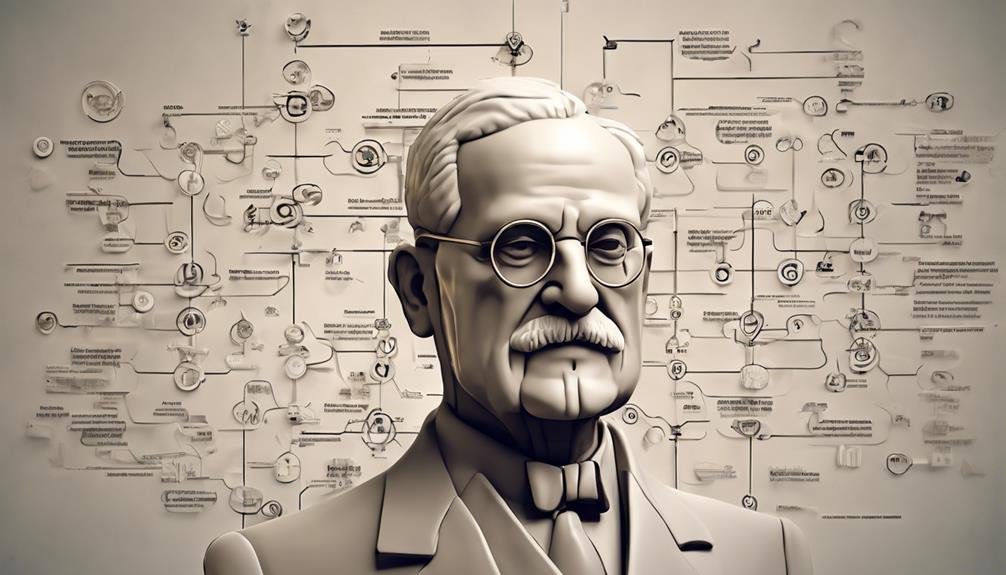Early Theories in Personality Psychology
As you reflect on the origins of personality psychology, ponder how early theorists like Freud, Jung, Adler, and Horney laid the groundwork for understanding the complexities of human nature. These foundational ideas not only provided insights into unconscious drives and social influences but also sparked debates that continue to shape contemporary theories of personality. Consider how these early perspectives set the stage for a rich tapestry of diverse approaches to unraveling the mysteries of personality, offering a glimpse into the intricate web of factors that shape who we are.
Key Takeaways
- Freud's Psychoanalytic Theory focuses on the unconscious mind and childhood experiences.
- Jung's Analytical Psychology explores archetypes in the collective unconscious.
- Adler's Individual Psychology emphasizes the inferiority complex and birth order dynamics.
- Horney's Psychodynamic Perspective considers social and cultural factors in shaping personality.
- Allport's Trait Theory highlights unique trait dimensions influencing behavior.
Freud's Psychoanalytic Theory
Freud's Psychoanalytic Theory revolutionized the field of psychology with its focus on the unconscious mind and the role of childhood experiences in shaping personality. Freud proposed that the mind is divided into three parts: the conscious, the preconscious, and the unconscious.
The unconscious mind, according to Freud, holds thoughts, memories, and desires that are outside of conscious awareness but still influence behavior. One key aspect of Freud's theory is the concept of defense mechanisms. These are strategies the mind uses to protect itself from anxiety by distorting reality.
For example, repression involves pushing distressing thoughts into the unconscious, while projection involves attributing one's own undesirable traits onto others. Defense mechanisms help individuals cope with internal conflicts and maintain psychological stability.
Freud's emphasis on the unconscious mind and defense mechanisms laid the foundation for understanding human behavior and personality development. By exploring these concepts, Freud highlighted the intricate ways in which past experiences and unconscious desires shape who we are.
Jung's Analytical Psychology
Studying Jung's Analytical Psychology uncovers a comprehensive approach to understanding the human psyche and personality. Carl Jung explored the concept of archetypes, which are universal symbols and themes that shape the collective unconscious of humanity. Through the investigation of archetypes, such as the persona, shadow, anima/animus, and the self, Jung aimed to illuminate the deep layers of the human mind that influence behavior and personality development.
Jung's emphasis on the collective unconscious analysis distinguished his theory from other personality psychologists of his time. By delving into the shared reservoir of human experience, Jung believed that individuals could access a rich source of symbolic meaning that could guide personal growth and self-realization.
This collective unconscious analysis also provided insights into the interconnectedness of individuals within society, highlighting the universal aspects of human nature that transcend cultural boundaries.
Adler's Individual Psychology
Carl Jung's analytical approach to personality psychology paved the way for the emergence of Alfred Adler's Individual Psychology, which offers a unique perspective on understanding human behavior and individual development. Adler's theory revolves around the concept of the 'inferiority complex,' suggesting that feelings of inadequacy or inferiority during childhood can greatly impact an individual's behavior and personality development throughout their life.
One key aspect of Adler's Individual Psychology is the emphasis on birth order dynamics. According to Adler, the order in which a child is born within a family can influence their personality traits and behavioral patterns. For example, first-born children may exhibit different characteristics compared to later-born siblings due to the varying levels of attention, responsibility, and expectations they experience growing up.
Adler's approach highlights the significance of understanding an individual's subjective experiences, social interactions, and unique perceptions of their environment in shaping their personality. By exploring the impact of early experiences, family dynamics, and personal perceptions, Adler's Individual Psychology provides valuable insights into the complexities of human behavior and development.
Horney's Psychodynamic Perspective
Horney's Psychodynamic Perspective offers a unique view on personality psychology, focusing on the impact of social and cultural factors on individual development. Horney believed that childhood experiences play an essential role in shaping personality, particularly in the formation of neurotic needs. These needs arise from interpersonal relationships during early stages of life and can lead to maladaptive coping strategies in adulthood.
According to Horney, individuals develop coping mechanisms to deal with feelings of insecurity and anxiety stemming from unmet needs in childhood. These coping strategies are believed to be influenced by societal norms and cultural expectations.
Horney identified three main neurotic needs: the need for affection and approval, the need for a partner who'll take over one's life, and the need to restrict one's life within narrow borders.
Allport's Trait Theory
Within the domain of personality psychology, Allport's Trait Theory stands as a foundational framework for understanding individual differences.
Allport proposed that individuals possess unique trait dimensions that influence their behavior and shape their personality. These trait dimensions, according to Allport, are the building blocks of an individual's distinctiveness.
Allport's Trait Theory emphasizes the importance of understanding the specific traits that characterize an individual, rather than focusing on general personality types. Trait dimensions such as introversion versus extraversion, neuroticism, openness, conscientiousness, and agreeableness are key components of Allport's theory.
To assess personality based on trait dimensions, Allport suggested using various personality assessment techniques. These techniques may include self-report inventories, behavioral observations, and interviews.
Skinner's Behaviorist Approach
Skinner's Behaviorist Approach in personality psychology focuses on observable behaviors as the primary indicators of an individual's personality traits. This approach is rooted in the principles of operant conditioning, where behaviors are shaped through reinforcement or punishment. Skinner emphasized the importance of the environment in shaping personality and believed that behaviors could be understood by studying the consequences they produce.
Operant conditioning, a key concept in Skinner's Behaviorist Approach, involves learning through reinforcement schedule. This means that behaviors can be strengthened or weakened depending on whether they're followed by a reward or punishment. Skinner argued that by manipulating the consequences of behaviors, one could effectively modify an individual's personality traits over time.
Skinner's Behaviorist Approach is focused on objectively measurable behaviors and how they're influenced by external factors. By studying how individuals respond to different reinforcement schedules, personality psychologists can gain insights into the development and expression of various personality traits.
Rogers' Humanistic Theory
You'll now explore Rogers' Humanistic Theory, focusing on his Core Conditions, Self-Actualization Concept, and Person-Centered Therapy.
These fundamental aspects of Rogers' theory emphasize the importance of empathy, genuineness, and unconditional positive regard in fostering personal growth and self-realization.
Rogers' Core Conditions
One of the foundational principles in Rogers' Humanistic Theory of personality psychology is the concept of core conditions. These core conditions include unconditional positive regard and empathetic understanding.
Unconditional positive regard refers to the therapist's acceptance and support of the client without judgment or conditions. It involves valuing the client as a person regardless of their behavior or beliefs, creating a safe space for self-exploration and growth.
Empathetic understanding, another core condition, involves the therapist's ability to deeply comprehend and communicate an awareness of the client's feelings and experiences. By demonstrating empathy, the therapist fosters a strong therapeutic relationship built on trust and validation, encouraging the client to express themselves authentically.
Rogers believed that when these core conditions are present in therapy, individuals are more likely to experience personal growth, self-acceptance, and psychological well-being. By providing a supportive and empathetic environment, therapists can help clients navigate their inner experiences and move towards a more fulfilling life.
Self-Actualization Concept
The self-actualization concept in Rogers' Humanistic Theory emphasizes the inherent drive of individuals to reach their fullest potential and achieve personal growth. This concept aligns with Maslow's hierarchy of needs, where self-actualization represents the pinnacle of human motivation and development.
Self-actualization is a self-driven process where individuals endeavor to realize their capabilities, potential, and talents fully. It involves continuous self-improvement, seeking out challenges, and pursuing personal goals that lead to a sense of fulfillment.
Within the self-actualization process, individuals often experience what Rogers described as peak experiences. These are profound moments of joy, creativity, and a sense of being fully alive. Peak experiences are catalysts for personal growth, providing individuals with a deeper understanding of themselves and their place in the world.
Through self-actualization and peak experiences, individuals can cultivate a greater sense of authenticity, self-awareness, and overall well-being in their lives.
Person-Centered Therapy
Person-Centered Therapy, developed by Carl Rogers as part of his Humanistic Theory, focuses on creating a supportive and non-judgmental therapeutic environment that empowers individuals to explore and address their own experiences and emotions. This approach emphasizes empathy development and client self-awareness as central components of the therapeutic process.
Empathy development in Person-Centered Therapy involves the therapist demonstrating a deep understanding and acceptance of the client's feelings and experiences. By providing a compassionate and empathetic environment, clients feel validated and supported in their journey towards self-exploration and personal growth. This empathetic connection allows clients to gain insights into their emotions and behaviors, fostering a sense of trust and openness within the therapeutic relationship.
Client self-awareness is another essential aspect of Person-Centered Therapy. Through the therapeutic process, individuals are encouraged to reflect on their thoughts, feelings, and behaviors without judgment. This self-exploration leads to increased self-understanding, personal insight, and the ability to make positive changes in one's life.
Eysenck's Biological Model
Eysenck's Biological Model in personality psychology proposes that individual differences in personality can be attributed to biological factors, particularly focusing on the role of genetics and physiological processes. Genetic influences play a significant role in shaping an individual's personality traits according to this model.
Eysenck suggested that introversion-extroversion and neuroticism-stability traits are influenced by genetic predispositions. For instance, introverted individuals may have a higher baseline level of cortical arousal, making them more easily stimulated than extroverted individuals. Neuroticism, characterized by emotional instability, is believed to be linked to differences in the limbic system's reactivity.
Eysenck's model emphasizes the biological underpinnings of personality, suggesting that these traits are heritable and influenced by brain structures and functions. While environmental factors also play a role in shaping personality, Eysenck's Biological Model highlights the importance of genetic influences in understanding individual differences.
Conclusion
So, after exploring these early theories in personality psychology, you may wonder: How have these foundational concepts shaped our understanding of personality development today?
Consider the influence of childhood experiences, unconscious motivations, and social factors on individual differences.
Reflect on the ongoing debates between nature and nurture in shaping personality traits.
Ultimately, these early theories have set the stage for a rich and diverse field of study that continues to evolve and expand.







